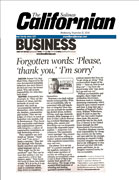Integrity Matters
November 15, 2006
Forgotten words: 'Please, 'thank you,'
'I'm sorry'

 Question: (E-262)
Question: (E-262)
Dear Jim:
Former U.S. Rep. Mark Foley, disgraced by his own documented
pedophile behaviors, has since blamed alcohol and even
his former priest. Who still accepts responsibility for
what they have done?
 Response:
Response:
Fortunately, lots of people do. They are the keepers
of values and the stewards of social constraints who
hold up "accountability mirrors" for themselves,
other individuals, families, communities and society.
They are not judges of others so much as imperfect role
models, still in development. They know that responsible
individuals and organizations operate with integrity,
a culture of constructive compliance, or risk destroying
society.
They regularly use such words as "please," "thank you" and "I
am sorry, I made a mistake." They follow through with friends, family members
and clients using language such as, "How might we fix the problem?" and "You
can be sure that neither I nor our organization will let that happen again." They
know the truth of these two-letter words: "If it is to be, it is up to me." And
before they rush to condemn others, they strive to transform themselves.
However, a no-fault culture breeds irresponsibility.
Without accountability, why be concerned with self-regulation
or integrity? How else can one account for escalating
alcohol abuse, reckless driving, road rage, domestic
violence, filthy language or a host of other culture-destroying
activities? Marriages, parenting, jobs, careers and
friendships are too frequently treated like disposable
paper napkins - temporary conveniences. The expression "serial marriage" was
created to describe those willing to replace serious relationships with superficial
transactions, over and over.
The phrase "it is not my job" is a painful reminder of the legalistic
extremes to which some members of society are willing to go to sidestep accountability
when a task in front of them lies outside their specific job description. The
image of the smoked-filled backroom of wheeling and dealing spawned a power-broker
political mantra that lives on: "to get along, go along." That counterculture
slogan of the 1960s - "turn on, tune in and drop out" - has been displaced
today with "stay aloof, let it go and cop out."
Without accountability and integrity, chaos reigns and
civilization deteriorates. Rudeness leads to violence,
destroying community, which depends upon mutual respect
and trust. A long time ago, a member of England's Parliament,
William Wilberforce, spent 30 years to pass the 1807
law that ended English slave trade. His success paved
the way for the abolition of slavery in the United
States through the 1863 Emancipation Proclamation.
President Abraham Lincoln took responsibility for changing
a society, for the better, and later paid for his courage,
stopping an assassin's bullet. Lincoln's integrity was
exhibited in his willingness to step forward and deal with
both praise and blame. As an integrity-centered leader,
he was accountable.